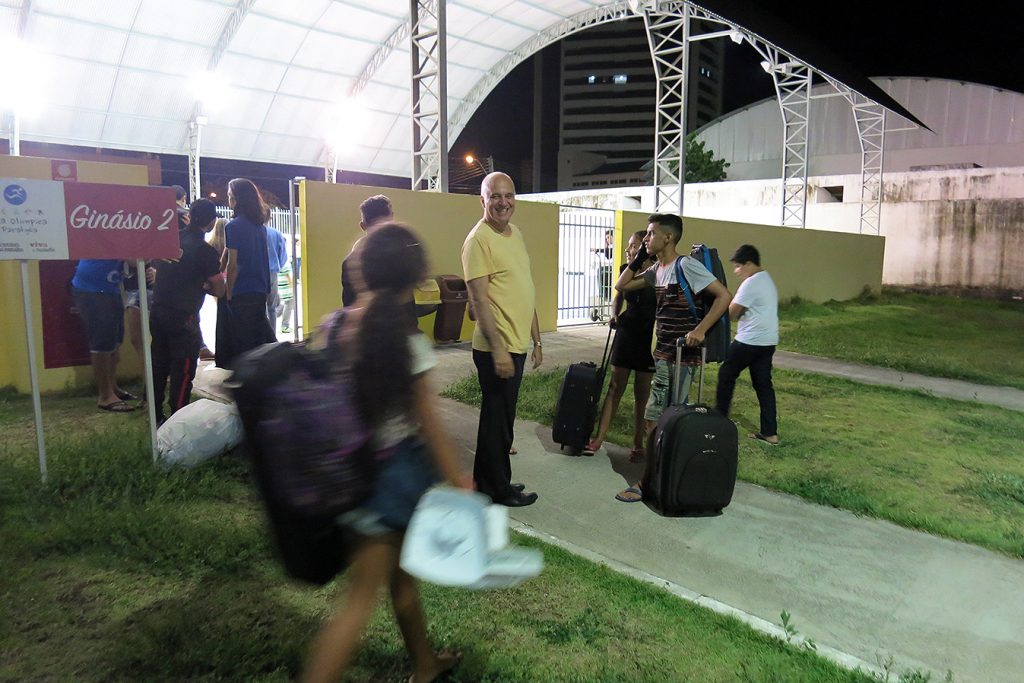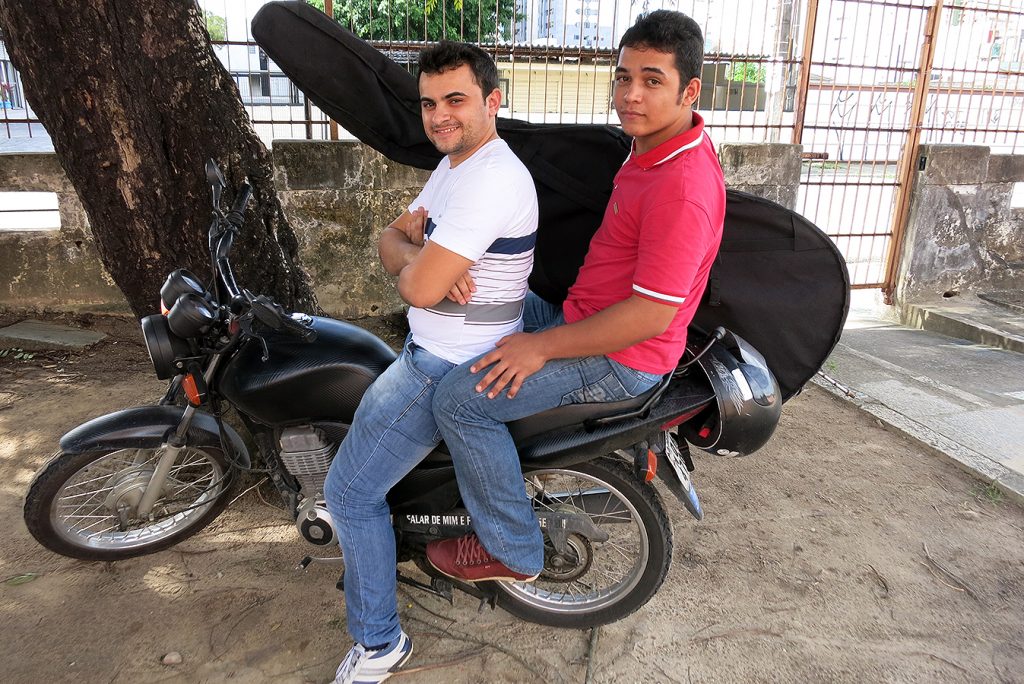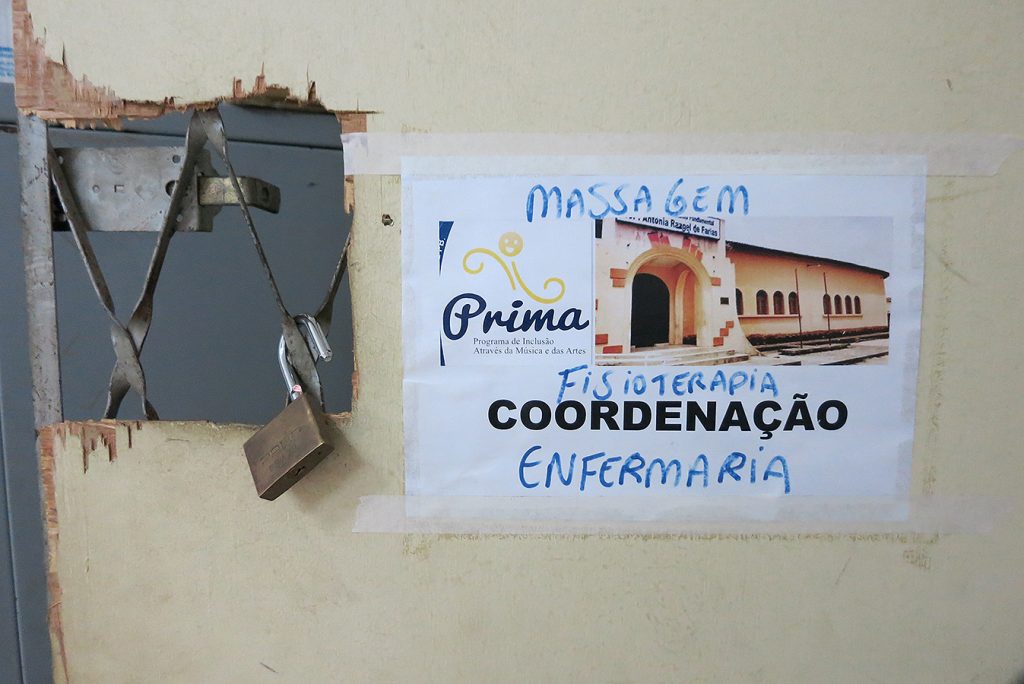JOÃO PESSOA, Paraíba, Brazil — Brasileiro Alex Klein, the Chicago Symphony Orchestra’s swaying, weaving principal oboe — once before, and now a second time — is bouncing around in his battered minivan.
Then traffic jams and ill-timed signals slow him down.
“One of my shock absorbers is no longer absorbing shocks.” Klein’s apologetic about the tossing, now congested ride into Mandacaru. “I’ve been through a lot of places that my car was not designed to be.”
Klein’s first CSO stint was cut short by focal dystonia, a neurological disorder that trips up messages traveling from his brain to his fingers, so he resigned and went home to Brazil. For the past several years, he’s roamed the backlands of Paraíba — this distant northeastern state that thrusts into the Atlantic at João Pessoa, its capital city, then pushes west on rough roads through arid plateaus. Heroic bandits and renegade padres plied these byways, well, not so long ago, trying to cajole guarded Paraíbanos steeled against the arms and amulets of transient charlatans.
“[Paraíbanos] had to fend for themselves, and they fear that people coming from the outside are not going to understand or respect what they went through,” says Klein, born 2,000 miles away in southern Brazil, “and often we don’t.”

Alex Klein (center) and the student musicians of PRIMA travel all over Paraíba to rehearse and perform. | Photo: Andrew Huckman
The blunt motto on the state flag is “NEGO” — call it “DEFIANCE” — brash angry capitals woven in scarlet and black for a land where violence still settles matters of honor. As recently as 1993, Paraíba’s then-governor got a medal for shooting his predecessor (who survived, blessed but undecorated). In 2012, Klein became music director of the state-run Orquestra Sinfônica da Paraíba, a colorful ensemble, he bemusedly recalls, that “has a history of musicians coming armed to rehearsal.” (“I’ve never seen it,” Klein reassures.) Soon he ceded leadership in favor of the orchestra’s youth program, Programa de Inclusão através da Música e das Artes, or PRIMA (Program for Inclusion through Music and Arts), a statewide initiative building civic awareness through music education. And so Klein armed himself to command the Sertão, Paraíba’s backlands, with an arsenal flush full of bassoons, trumpets and violas.
He still wages a proud battle against tough odds. Last year, João Pessoa, with just 40 percent of Chicago’s population, notched a third more homicides (a projected 643 to Chicago’s actual 468), and PRIMA deliberately locates its dozen musical havens in what Klein calls “the places with highest social risk in Paraíba.”
“Our students are from the worst areas possible,” he says. “Where there’s more crime, more drugs — there we put a youth symphony.”
“And, lo and behold, these people can play and they love what they do. It doesn’t matter if it is classical music.”
A once-battered musician, physically and professionally, Klein loves what he does, too. Pushing distant frontiers in his native land “to teach citizenship through music,” he steels Brazil’s toughest kids for promising futures.
There’s a winning confidence in these players that comes back toward Klein, driving the oboist-conductor to challenge his own physical limits, and now, re-embrace his Chicago artistic legacy. This season, after winning his second open audition a remarkable 21 years after the first, Klein retakes his chair as CSO principal oboe.
With patience, Paraíba’s narrow byways move everyone ahead. Pull to the side awhile and help the oncoming crowd get moving. Now there’s open road for the journey. Understand these blocked routes — their limitations and possibilities — and get where one’s meant to return.
Até logo — it’s just ‘until next time’
Saturday afternoon Klein’s van rolls up to an elementary school near Mandacaru, a João Pessoa bairro reportedly divided along gang fault lines. It’s the end of July and, with weekend rehearsals and a Sunday farewell concert, Klein is about to say “até logo” to PRIMA’s budding talents — not so much “goodbye” as an optimistic “until next time.”

PRIMA bassists Tamisson (left) and Leonardo navigate Paraíba’s narrow byways like modern-day jousters and troubadours. | Photo: Andrew Huckman
A hundred young musicians from all over Paraíba gather in the old schoolhouse, with arcades for shade and open windows for breezes. Everyone’s in flimsy plastic chairs and worn rubber Havaianas (the flip-flops, Paraíba’s most celebrated export, are made in a factory 80 miles away). Klein, too.
Paraíba’s distrust of outsiders seems to fall away around the seemingly easygoing oboist and maestro, at least with this youthful crowd. If winning the respect of Paraíbanos is about, as Klein suggests, understanding what the people of this northeastern state have endured, maybe some kids sense in this southern Brazilian gaúcho from Porto Alegre, an affluent state capital, a man who’s struggled, too.
Klein resigned from the CSO in 2004 and went back to live with his parents. He’s recalling those dark days, in English — rare in Paraíba — this sunny afternoon at the schoolhouse. A few PRIMA students sit at the same plastic table, intuitively sensing Klein’s intensity and emotion without always grasping the intricacies of how he communicates. That’s how a generation of CSO audiences understood, and still remember, this oboist’s virtuosity.
“I felt horrible about leaving [Chicago],” he recalls. “I was so depressed I spent months — probably the next six months after leaving the orchestra — sleeping on my parents’ couch in the living room. I couldn’t sleep. Around 2 in the morning, I would collapse, and by 4:30 in the morning, I was wide awake. I was walking like a zombie all day long, half-asleep, half-awake. I had no idea how to understand what happened.”
Three years earlier in 2001, Klein had noticed traces of focal dystonia. He describes the disorder as something akin to a “task-specific” traffic jam where mental messages meant for two of his fingers don’t always make it in time — especially when he’s playing the oboe.
“Focal dystonia is in the brain,” Klein explains, but the physical workaround has side effects. “The compensating action that I do to circumvent the problem is what gives me tendonitis, because I have to force my fingers to go to a position of tension in order to play,” with frequent pain as a byproduct.

PRIMA’s temporary administrative office doubles as an infirmary offering massages and physical therapy. | Photo: Andrew Huckman
Today the oboist understands his focal dystonia as a fixed parameter — “it is for life; it will not improve or get worse” — and manages it as a predictable “limitation that I can work with or work around.” He’s invented what he describes as “a sensory trick that makes my brain think I’m playing some other instrument, like a saxophone, where the fingers play a little bit sideways. That way I can avoid the [neurological] pathway that deals with oboe [fingerings].”
Managing the disorder isn’t a matter of diminished technical ability — Klein compensates with the adapted fingerings and a modified bridge on his instrument. The issue is endurance and the corresponding tendonitis. “For the last several years I’ve been trying to find out how much is too much.” By experimenting within focal dystonia’s fixed parameters, he has been able to prepare for the familiar rigors of returning to orchestral playing.
They’re solutions Klein had no way of seeing in 2004.
“When I left the CSO I could play only an hour a day,” he says. However, no one asked him to resign his post. Klein was his own tough judge, delivering the verdict and sentencing himself. “I was feeling like a bad colleague — that I was not trustworthy. And I shouldn’t be there if I was not reliable. And that’s why I renounced. And I left.”
He still questions his choice. “Every day of the last 12 years I’ve mulled over that and I’ve asked myself, ‘Was this the best situation?’” But the abstract answer didn’t matter much to an oboist who felt “like I died.” “People felt bad that I left, and gradually my name was disappearing and my life became — belonged to — history.”
“One of the questions I asked myself is, ‘What do I have that’s still worth something — what do I have that can still be good for something?’”
That’s why Klein chose PRIMA, Paraíba’s youth music and citizenship initiative.
“I’ve always had this desire to make something happen — that will make a difference,” he says, and the students at the plastic table somehow seem to notice. “That we’re not going to be a statistic in human history, that we’re actually going to leave something behind that’s of value. And PRIMA is all about that.”













